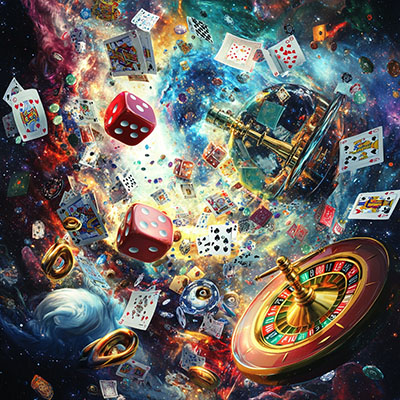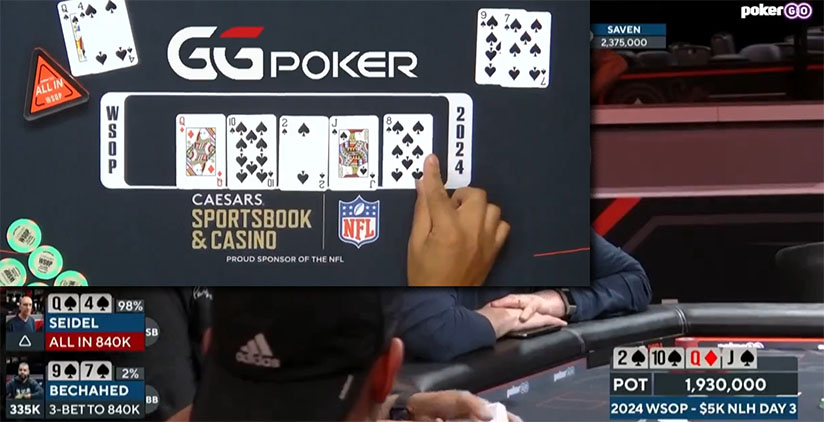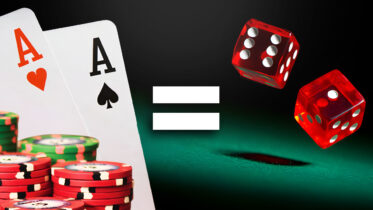From the time the first poker rules and games were created, a debate has been raging about whether it’s just another gambling game, a game of skill, or something in between.
Many people who have never played a single hand of poker are quick to judge it as just another gambling game that’s only played by degenerate gamblers looking for the thrill, which is definitely far from the truth.
On the other hand, many in the “skill” camp refuse to admit that poker does include an element of gambling, and poker players must rely partially on luck to win on any given day.
So, is poker gambling or not? We have weighed all the arguments and gone deep into the weeds to find out and get a definitive answer to this never-ending debate.
What Is Gambling?
According to some definitions, gambling is the action of wagering money or other possessions on the outcome of a game or event that is somewhat random.
However, there are many different degrees to gambling. For instance, playing a tennis match against Rafael Nadal would hardly be gambling for most of us, as we would stand to lose any wager we made on such a foolish endeavor.
On the other hand, wagering if a coin will land on heads or tails is perhaps the purest form of gambling, as neither side has an advantage, and the odds are dead even.

Contrary to this, most casino games actually give the house a significant edge. Anytime you play slots or blackjack against the casino, you are not really gambling but rather losing money in terms of expected value, as the games inherently favor the casino.
Yet all these games are considered pure gambling games, mostly because there is very little one can do to tip the scales in their favor. While poker can be considered a sport by some, that’s not the case with casino games.
Even playing optimally in games like blackjack, the best you can do is get close to breaking even, still losing a slight amount of EV every time you bet.
So, we can conclude that gambling is the act of wagering money on games in which only pure chance can help us win on any given day. In the long run, all gambling games you will find in a casino lead to a loss, regardless of your strategy.
Does Poker Fit the Criteria?
So does poker fit the criteria to be a gambling game? Well, not quite! In fact, there is one major difference between poker and other gambling games that completely excludes the game from the discussion.
Unlike all gambling games, poker is not played against the house but rather between players, and there is no inherent edge ingrained in the game that would make any player a winner or a loser.
If all players played the game exactly the same, rake and fees would end up eating all the money, making the casino or poker room the only winner in the game.
However, poker strategy can be played in many different ways, and every decision you make at the table influences the result.
Granted, each hand of poker is still heavily influenced by chance, but players’ actions contribute greatly to the outcome of each hand. Over the long run, those actions add up and inevitably lead to some players winning and others losing in the games.
Over the years, we have seen plenty of players prove that results in poker can be predicted, whether we are talking about the big winners or the big losers out there.
So, we can conclude that poker does not fit the criteria to be considered a gambling game, although chance does have an impact on any given poker hand.
The Role of Luck in Poker
The reason many people think the impact of luck on poker is greater than it really is comes from focusing on some specific scenarios in the game.
Indeed, there are many situations in poker where luck will determine the outcome of a given hand or your destiny in a tournament.

Some examples of this include:
- Going all in with a pair against two overcards
- Going all in with a made hand against a draw
- Going all in with a strong preflop hand like KK or QQ
In all of the scenarios above, you may end up committing all your chips with a statistically better hand and still end up losing.
What’s even more, a hand like KK or QQ will end up running into AA from time to time, causing you to lose your entire stack without making what professionals would call a mistake.
Of course, if you were to only ever play that single hand of poker in your life, then poker would be all about luck and there would be very little skill involved.
Yet, it is important to remember that these things even out over the long run, and you will get AA against KK just as many times as you will get KK against AA.
Throughout your career, you will hit exactly the right number of flush draws and straight draws and fade just the right number of draws with your sets, completely negating the role of luck in your results.
What Does the Science Say?
Determining whether something is true or not by making assumptions is not adequate, which is why science is needed to conclude whether poker is a gambling game or a game of skill.
In 2009, a couple of researchers from the Institute of Law and Economics at the University of Hamburg decided to conduct scientific research looking into the topic.

The research included records of over 50,000 online poker players and looked to determine the Critical Repetition Frequency (CRF) for different players.
This measure represents the number of poker hands (or repetitions of any kind) needed to get within 95% certainty that the findings are dependable.
The research found that the players with higher bb/100 (win rate) would need fewer hands to get within that 95% certainty, indicating that in-game skill directly correlated with the results.
Players with a 5bb/100 needed 118,000 hands on average to get within that range, which is exactly what most professional poker players have come to expect.
Overall, this study showed a very strong argument for poker as a skill game and proved almost beyond any doubt that any impact luck has on poker is only short-term, while the long-term results are determined solely by the player’s skill and strategy employed at the tables.
Impact of Skill in Poker
While millions of people around the world play poker on a semi-regular basis, only some of them win regularly, with some of those making the game into a career.
Professional poker players rely on skill and strategy instead of luck and understand that playing against inferior players for enough hands will produce positive results.
Skill in poker includes everything from your starting hand poker ranges to bet sizing and bluffing frequencies, and the more versatile your poker skillset is, the more likely you are to be a big winner.

Note that there are many different degrees to which you can win at poker, and just because you are a big winner in one game does not mean you will be a big winner in another.
In fact, choosing the right table to sit at and players to play against might just be one of the most important poker skills, called table selection.
When all different poker skill elements are added up, the difference between the best players and the worst players in a game can be quite drastic, and the final win/loss rates of the two players can end up being the exact opposite.
If you don’t trust us, check out the long-term results of some of the best and worst players in online poker, and you will notice the direct correlation between skill and results over larger hand samples.
Importance of Consistency
Looking at all the elements that make up the game of poker, it is quite clear that this is a skill game in which luck only plays a role in the short term.
This is the one area where most players get it wrong, as they focus on short-term results and forget the importance of consistency of volume.
If you want to see success in poker, you will need to play better than your opponents and put in enough volume for your skill edge to overcome short-term variance.
The higher your edge over your opponents, the fewer hands you will need to play to overcome variance. However, playing a single session of poker will never be enough to demonstrate your skill level in its entirety.
So, if you are still wondering if poker is all about luck or skill, keep on playing, improve your poker skills, and you will see that the results will follow without mistakes.
As long as you are able to find weaker opponents and play enough hands against them, the skill advantage will overcome the impact of luck, and you will end up on the right side of things.





